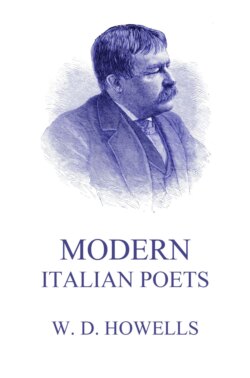Читать книгу Modern Italian Poets - William Dean Howells - Страница 9
На сайте Литреса книга снята с продажи.
I
ОглавлениеGiuseppe Torelli, a charming modern Italian writer, in a volume called Paessaggi e Profili (Landscapes and Profiles), makes a study of Carlo Innocenzo Frugoni, one of the most famous of the famous Arcadian shepherds; and from this we may learn something of the age and society in which such a folly could not only be possible but illustrious. The patriotic Italian critics and historians are apt to give at least a full share of blame to foreign rulers for the corruption of their nation, and Signor Torelli finds the Spanish domination over a vast part of Italy responsible for the degradation of Italian mind and manners in the seventeenth century. He declares that, because of the Spaniards, the Italian theater was then silent, “or filled with the noise of insipid allegories”; there was little or no education among the common people; the slender literature that survived existed solely for the amusement and distinction of the great; the army and the Church were the only avenues of escape from obscurity and poverty; all classes were sunk in indolence.
The social customs were mostly copied from France, except that purely Italian invention, the cavaliere servente, who was in great vogue. But there were everywhere in the cities coteries of fine ladies, called preziose, who were formed upon the French précieuses ridiculed by Molière, and were, I suppose, something like what is called in Boston demi-semi-literary ladies—ladies who cultivated alike the muses and the modes. The preziose held weekly receptions at their houses, and assembled poets and cavaliers from all quarters, who entertained the ladies with their lampoons and gallantries, their madrigals and gossip, their sonnets and their repartees. “Little by little the poets had the better of the cavaliers: a felicitous rhyme was valued more than an elaborately constructed compliment.” And this easy form of literature became the highest fashion. People hastened to call themselves by the sentimental pastoral names of the Arcadians, and almost forgot their love-intrigues so much were they absorbed in the production and applause of “toasts, epitaphs for dogs, verses on wagers, epigrams on fruits, on Echo, on the Marchioness's canaries, on the Saints. These were read here and repeated there, declaimed in the public resorts and on the promenades”, and gravely studied and commented on. A strange and surprising jargon arose, the utterance of the feeblest and emptiest affectation. “In those days eyes were not eyes, but pupils; not pupils, but orbs; not orbs, but the Devil knows what,” says Signor Torelli, losing patience. It was the golden age of pretty words; and as to the sense of a composition, good society troubled itself very little about that. Good society expressed itself in a sort of poetical gibberish, “and whoever had said, for example, Muses instead of Castalian Divinities, would have passed for a lowbred person dropped from some mountain village. Men of fine mind, rich gentlemen of leisure, brilliant and accomplished ladies, had resolved that the time was come to lose their wits academically.”
